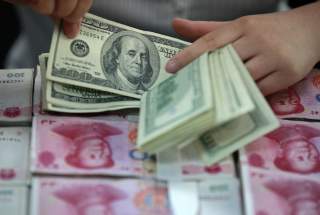Xi Jinping's Debt Trap
President Donald Trump’s “trade war”—the imposition of tariffs—has the potential for shaking the export-dependent Chinese economy.
President Donald Trump’s “trade war”—the imposition of tariffs—has the potential for shaking the export-dependent Chinese economy. The problem for Beijing is that it has become deeply reliant on the American market. Last year, China’s merchandise trade surplus from exports to the United States constituted a stunning 88.9 percent of its overall merchandise surplus. Add to that China’s merchandise surplus with the United States in 2017, which amounted to $375.6 billion, and it’s clear Trump holds the high cards.
So far, the American president, unlike his predecessors during the last forty years, has shown a willingness to use American power to undermine China. Chinese analysts are starting to understand that their country, for many reasons, cannot sustain a long-term struggle with its most important customer. Not surprisingly, China’s equity markets and currency all fell precipitously this year as the “trade war” started.
XI HAS lost support abroad, and at home he is simply out of step with society. Perhaps the most important consequences of forty years of Chinese economic reform is modernity.
Xi can get his way because he commands the power of the enriched state and Party and has at his disposal what is surely the most sophisticated set of social controls in history. But he has trouble compelling compliance except when resorting to the crudest forms of coercion. Due to modernization, he does not have the power to persuade. Take what are called Xi’s Cultural Revolution-style campaigns, such as his effort this summer to promote “the spirit of patriotic struggle” among intellectuals. Many ridicule him, but the overriding reality is that China’s intellectuals—and the Chinese people—are just not paying attention.
“The Cultural Revolution analogy really doesn’t capture what is happening here now,” Sam Crane, a political science professor at Williams College, told The National Interest toward the end of a stint in Beijing on the campus of Renmin University of China. In his words,
After a month on the Renda campus I can say I have seen no sign of the Xi Jinping personality cult. Indeed, throughout Beijing Peppa Pig has been more prominent than Supreme Leader Xi. Moreover, throughout the city signs of American soft power influence—in consumer preferences, in the lines outside the U.S. embassy, in the personal messages on tee-shirts, in the youth culture in bars and clubs—is still quite strong. Perhaps Xi and other conservative Party stalwarts are pushing the patriotic campaign against intellectuals precisely because they know they are losing the larger culture war.
The censors working for China’s ambitious leader this spring banned Peppa Pig, but that did not do much good. They only heightened the adorable cartoon character’s popularity in society, even creating sympathy for the slackers who made the animal their symbol.
China’s strength—and the regime’s ultimate weakness—is that the Chinese people are often defiant, mostly irrepressible and always noisy. They have the temerity to protest and, in any event, almost always find a way to express how they feel, whether Xi likes it or not. Xi can create a surveillance state with a projected 626 million cameras in place by 2020, but he does not need a single one of them to see where society is going.
Many Chinese see Xi’s moves to be “the comprehensive resuscitation of totalitarian politics,” as Tsinghua University law professor Xu Zhangrun stated in a widely circulated essay. “After forty years of reform,” he wrote, “overnight we’re back to the ancien régime.”
In many ways Xu is correct, but this time there is a new hint of popular discontent, even inside the Party itself. “I recall a topic hotly debated online by young internet users: Who is really China’s enemy? Is it America? Japan? Russia?” wrote Luo Jianbo, chief of the China Foreign Policy Center of the Central Party School, last September. “If we think about things coolly, perhaps none of them are. China’s enemy is itself.”
Gordon G. Chang is the author of The Coming Collapse of China.

